A Compassionate Critique of Zoe's Daily 30+ Supplement: Navigating Equity, Transparency, and Mindful Eating
A journey through the nuances of nutrition science, accessibility, and the power of whole foods.
Yesterday, I read an excellent article by
on her publication, .
What’s All the Fuss About?
So Tim Spector’s company Zoe has launched a supplement called Daily 30+ that contains a mix of dried food. Spector has been quite vocal about food supplements historically. In fact, in a recent feature about Daily 30+ in The Times, he said:
Half the population takes supplements regularly, but 99 per cent have no evidence they work. With specific exceptions, including folic acid during pregnancy, iron tablets for those who are anaemic or vitamin B12 for people who've had part of their gut removed, the vast majority of food supplements are a complete waste of money and lull us into a false sense of health security that can, in fact, be detrimental. People pop a multivitamin and carry on eating rubbish.
In contrast, Zoe, which launched in 2018, made sure the Daily 30+ was put through rigorous randomised control trials, the gold standard of effectiveness research usually used to test pharmaceutical drugs, and unusual for supplements.
That's why most companies don't do it. But we hope people will demand that in future, once they see these products have been proven by science.
The clinical trial is funded by Zoe and has been pre-published in MedXriv, (pronounced "med-archive").
The “about” section of MedXriv describes the website as “a free online archive and distribution server for complete but unpublished manuscripts (preprints) in the medical, clinical, and related health sciences. Preprints are preliminary reports of work that have not been certified by peer review. They should not be relied on to guide clinical practice or health-related behaviour and should not be reported in news media as established information.”
One of the big issues here is that the results of the clinical trial are being discussed by Spector in a range of newspapers, magazines and other media outlets, as well as on Zoe’s on website. An article entitled Can you really get your 30-a-week plant intake in one daily supplement? published in The Times on 29th June (paywalled) says:
In the 350-person trial, one control group was given dried croutons while another group was given Daily 30+. After six weeks 51 per cent of supplement takers reported an improvement in energy and saw a significant improvement in the composition of their gut bacteria: an average five-point increase on Zoe's microbiome score.
Spector says this is thanks to more than 7,000 polyphenols contained in the broad spectrum of plants and fungi in the supplement, which protect us from inflammation.
"They shift the ratio of good and bad bugs so we get a healthier microbiome, which we know leads to a better immune system."
Which bit of “Preprints should not be relied on to guide clinical practice or health-related behaviour and should not be reported in news media as established information” is the media not getting? It puzzles me. But then again, it doesn’t. And here’s why…

Here Are My Thoughts…
The product itself is good. I like the idea of a food-based sprinkle of 30+ plants added to any meal. I’ve been doing this myself with a mix of whole grains, fruits, herbs, and spices, so I can’t fault it. I also use a lot of herbs and spices in my cooking. Adding a tablespoon of mixed herbs with 10 ingredients is a fabulous way to add diversity to any meal, so I get it completely.
I also understand that Zoe is a business and needs to generate revenue. We live in a capitalist society, so that’s not a surprise. I can live with it.
What I dislike is the disingenuous undertone of statements like “most supplements don’t work, but ours does because we’ve done a randomised controlled trial (RCT) on it, the gold standard of research.”
I’m a scientist. I’ve had to get funding approved for research, and clinical trials cost a lot of money. This means that not everyone has the machinery necessary to run them, or the support of a university like Kings College London, the sponsor of the Daily 30+ study in this case. Most supplement manufacturers also lack the ability to disseminate the findings in top-quality scientific journals as well as mainstream and social media. I have advised various food supplement companies in the last 20 years, from global to family-run, and this has always been the case.
Power Dynamics at Play
Prof Spector is co-founder of Zoe and also has a position of power at Kings College London, the sponsor of the study. This dual role raises significant concerns about the potential conflict of interest. It's crucial to acknowledge the immense power imbalance here: on one side, we have a prominent academic with substantial resources and influence; on the other, numerous smaller supplement companies lacking the same financial and institutional backing. If supplement companies had access to the funds and the knowledge that enables the Zoe studies to happen, I am pretty certain that we’d see more successful clinical trials on supplements that are out there and are being discredited.
Mixed Messages
Another important point is that Tim Spector says he's only calling this a supplement because he has no other choice due to legal definitions, but he insists it's actually food. This creates a mixed message: if it's food, why is there a need for an RCT to prove it works? While I understand that the RCT is testing this specific combination of foods, many of the individual ingredients have already been shown to have a wide range of health benefits in their own right.
I fear the general public will start believing a food combination is not worth consuming unless tested in an RCT. This also risks promoting a mindset where people rely solely on scientific validation over their own intuition and mindful eating habits. We should encourage people to trust in the known benefits of individual wholesome foods and not feel compelled to seek out only those combinations that have undergone rigorous testing.
Furthermore, this approach raises concerns about accessibility and equity. The Daily 30+ supplement is priced at £39 a month per person, which makes it inaccessible to many who cannot afford this expense. Is this science only for an elite who can afford Zoe-branded products, rather than for the greater good of the entire population, regardless of financial means? Good nutrition should be a right, not a privilege, and emphasising expensive, branded solutions over affordable, everyday foods risks widening the gap in health disparities. We must ensure that advancements in nutrition science benefit everyone, not just those who can afford premium products. This is at odds with Spector’s traditional message of supplements being expensive. And if the price tag is being justified by the research that substantiates the product, that falls into the same trap of promoting scientific validation over mindful healthy eating habits.
Pre-Publication & Other Crunchy Bits
The trial being pre-published in MedRxiv further complicates things. Preprints are not peer-reviewed, meaning the study’s findings haven’t undergone the rigorous scrutiny that typically validates scientific research. This should be clearly communicated to the public to avoid misinterpretation of the supplement's efficacy.
Moreover, the choice of croutons as a control is puzzling. Croutons are not an inert placebo; they are processed food with their own nutritional profile, which could confound the study results. The use of a functional control like croutons may introduce variables that obscure the true effects of the prebiotic blend. Ideally, a control should be as neutral as possible to clearly isolate the impact of the supplement itself.
Disparity of Resources
This scenario highlights a broader issue in the supplement industry and scientific research: the accessibility of resources necessary to conduct high-quality studies. While the RCT conducted by Zoe is commendable, it doesn't necessarily imply that their product is superior to others that haven't been tested in the same rigorous manner. It merely reflects the disparity in available resources.
Furthermore, the narrative that “most supplements don’t work, but ours does” can be misleading. It undermines the efforts of other supplement companies and researchers who may not have the same level of access to funding and academic partnerships. This creates a skewed perception of the supplement industry, where products from less-resourced companies are automatically seen as inferior.
Personal Reflections, Transparency and Fairness
This critique is not a personal attack on Tim Spector. In fact, I had the privilege of working with him from 2015 to 2017 as Head of Education at MapMyGut, the prequel to Zoe. I deeply admire his views on food as a primary source of health prevention. We even published an article together entitled Could Food Act as Personalized Medicine for Chronic Disease? You can download a copy of this article below. This collaboration was rooted in the shared belief that food can be a powerful tool for health. However, my concerns here are about the approach that Zoe is taking. It's about ensuring that scientific advancements are transparent, equitable, and accessible to all, without creating an undue burden on those who cannot afford high-priced supplements.
In conclusion, while advances in the science of food and the microbiome are welcome, there is something fundamentally off when such advances are used to create a commercial product underpinned by a potentially conflicted study. It's not just about the validity of the supplement but about ensuring transparency and fairness in how such products are brought to market and perceived by the public. We should advocate for a more level playing field where scientific research and commercial ventures are clearly separated to maintain public trust and ensure that all supplements are judged on their true merits, not just the resources backing their trials. Zoe blurs the line there, and the additional concerns about power imbalances are also a bit of a red flag for me.
Create Your Own Diversity Sprinkle
During the COVID lockdowns, I embraced mindful eating. For too long, I had demonised whole food groups like carbohydrates, which meant that I ate almost no whole grains for many years. This was at odds with my knowledge that there are numerous systematic reviews and meta-analyses (larger pools of data that are even more reliable than single randomised controlled trials) showing that whole grains are vital sources of polyphenols and microbiota-accessible polysaccharides or MACs for shor; how cute is that? 😍
Reliable scientific sources that have been published, peer-reviewed and available for everyone to read for years attribute a lot of the “health value” of the Mediterranean diet - touted as being amongst the healthiest in the world - to whole grains like wheat, barley, spelt, rye and oats, as well as to olive oil, of course.
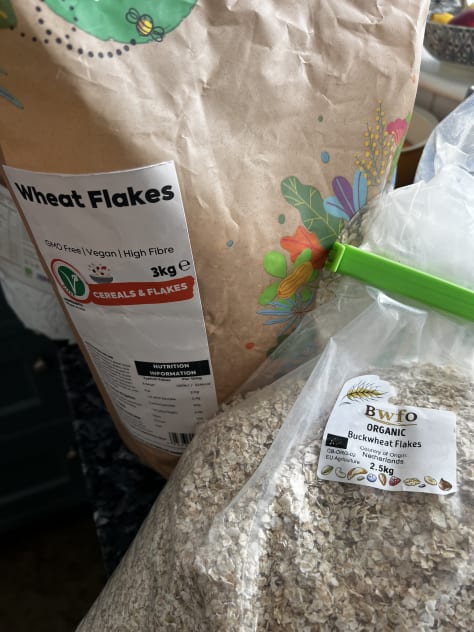
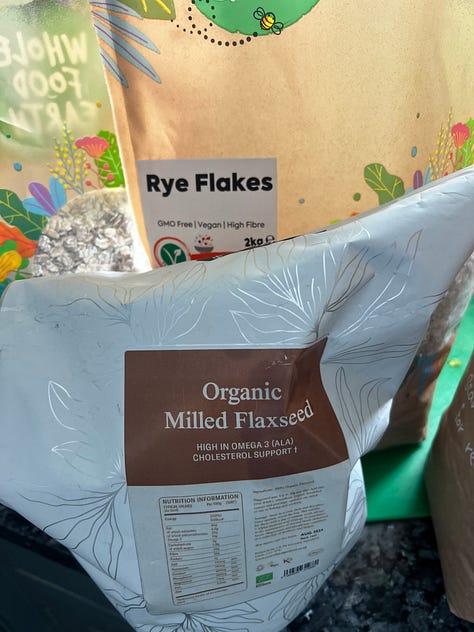

MACs are types of carbohydrates that can be broken down and used by the beneficial bacteria living in our gut. These carbs are not fully digested by our own enzymes and instead reach the colon, where gut bacteria ferment them, producing substances that promote gut health and overall wellbeing, like butyrate or butyric acid, for example.
Based on my knowledge of diversity. I started making my own “diversity blend,” which I’ve been chopping and changing as I’ve gone along, but that always has the same main groups of ingredients:
Whole grains
Dried fruit
Herbs
Spices
Mushrooms
Other bits!
My Current Diversity Blend
I simply buy ingredients in bulk and mix them into a large container. Some are really easy to mix in. Adding in the whole grains is as simple as decanting them from their original packaging. Some others require some prep, like spices and some herbs need to be milled or ground. I just use a coffee grinder to create a powder that I add to the main mix. That’s how I manage to blend in a bit of whole star aniseed (great for digestive wellness), nettle leaves, chamomile flowers, vervain, dried leek, carrot, and tomato.
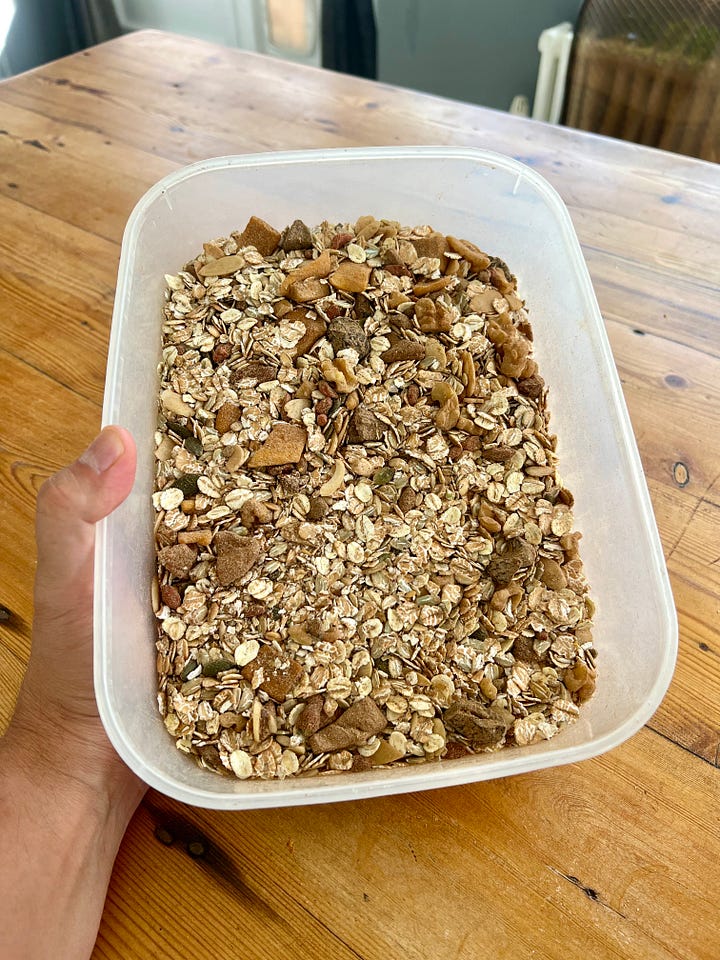

At the moment, my diversity blend has the following ingredients. I sometimes use it as a breakfast cereal and other times as a sprinkle on salads, yoghurt or kefir. I’ve even added it to soups for a bit of extra flavour and crunch.
Wholegrains
Wheat, rye, barley, spelt and buckwheat (more of a pseudograin and in fact a seed, but listed here anyway), all in flakes.
Dried fruit
Prunes, apricots, mango, goji berries, sultanas. I chop the prunes and the apricots into tiny bits so they’re easier to chew. I sometimes add figs too, but I’ve run out and I didn’t get them back in because they were quite expensive and I’ve got enough going on anyway, so I’m trying not to obsess if I’m missing an ingredient.
Nuts and Seeds
I get a 4-seed mix from Aldi that has pumpkin, sunflower, hemp and golden linseed and put nearly a whole bag of that every time I make a new batch. I also add a generous amount of ground flaxseed and some desiccated coconut and a couple of handfuls of chia seeds, some flaked almonds and some walnuts and cashews gently crushed into smaller pieces.
Herbs and Spices
Cinnamon, star anise, cumin, turmeric, chamomile, rosemary, mugwort, vervain, parsley and nettle leaves. I use some chia seeds in the coffee grinder to so these get some traction.
Mushrooms
I add a large scoop of a mixed organic mushroom powder that contains reishi, chana, shiitake, lion’s mane, cordyceps, white fungus and maitake. I also add some additional organic lion’s mane powder.
Vegetables
I’m a big lover of dried vegetables. They’re amazing to add to soups or in cooking, and I even have a pepper mill filled with them that I use to sprinkle a bit of powdered veg onto my food for some extra kick. You have to get your dopamine where you can, and I LOVE food! 😍 So I’ve been experimenting with grinding a ready mix of tomato, carrot, parsnip, leek, onion, garlic and parsley I’ve been buying when I go to Spain along with chia seeds. This works great for creating a wax-like powder that sticks to larger chunks in the diversity mix, like the prunes and the apricots, as well as the whole grain flakes. The trick is to add enough so that the nutrients are in there, without adding so much of it that it tastes funny when you add it to yoghurt or kefir. It’s a matter of trial and error
Other Stuff
Raw cocoa powder, lucuma powder and nutritional yeast.
Making your own mix is simple and can be tailored to your taste and nutritional needs. It’s a matter of trial and error, finding what works best for you. My current batch has 44 ingredients but may have only 35 next time. Then it may have 50. I try to keep it as varied as possible, but I also try not to obsess over it. It’s not a competition, and I’m not relying exclusively on the nutrients in these ingredients for my health. They’re just an additional layer superimposed onto my everyday food choices. So, my advice to you is to remember that it’s not about perfection but about creating a blend that you enjoy, and that supports your health and makes you feel good.
It’s Not the Destination. It’s the Journey…
Embracing a diversity mix is not just about nutrition; it's about reconnecting with the simplicity and richness of whole foods. It’s about managing your health in a mindful way where you listen to your body without needing to know every tiny scientific detail about every bit of food you put in your body. Start small, be creative, and enjoy the process. Every sprinkle is a step towards a healthier, more vibrant you who celebrates the diversity on your plate and in your life.
Remember, true health and wellness are built on the foundation of variety, balance, and enjoyment in your daily meals. By creating your own blend, you're not just nourishing your body, but also embracing the creative and intuitive aspects of eating. Celebrate your unique journey with food, and let each meal be an opportunity to honour the incredible diversity of nature and the joy of nourishing yourself with love and care.
Much love,


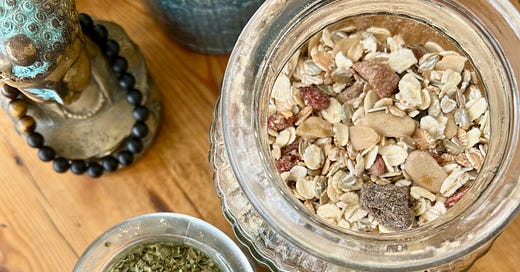




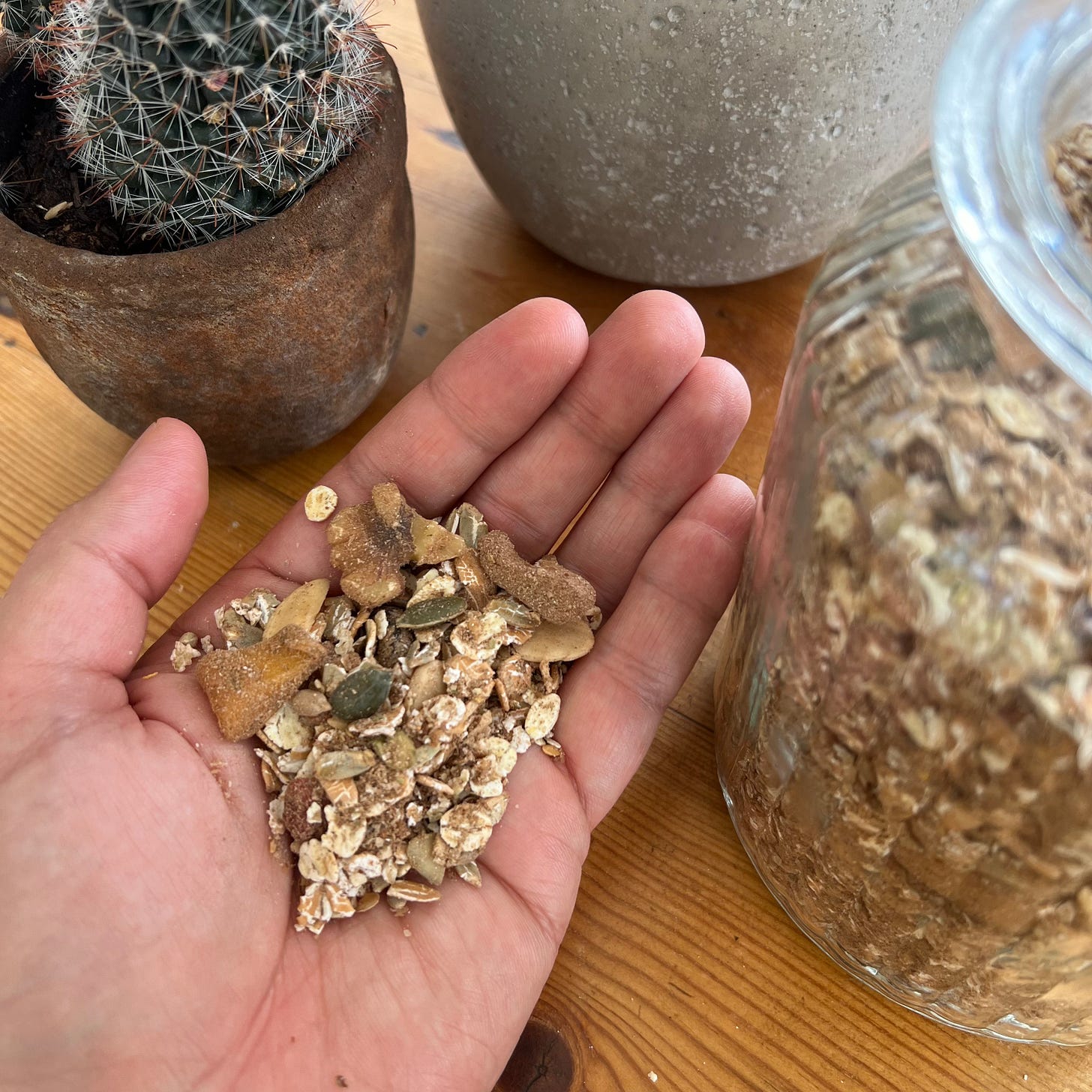
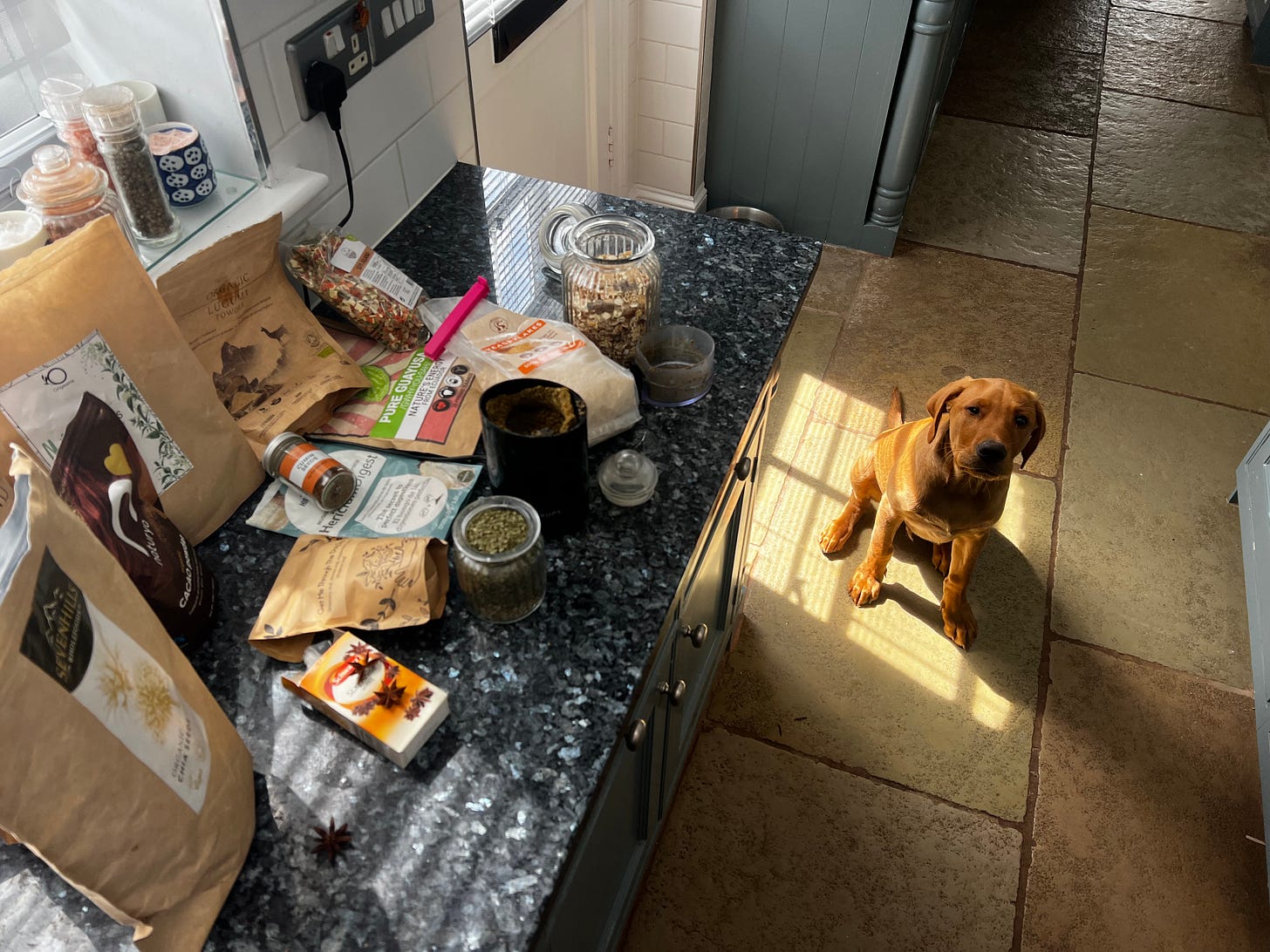

This is a great, measured piece. The thing that disappoints me most is the loss of trust involved here. Spector has been promoting the 30+ plant foods a week idea for a long time, and I now have to wonder whether that was just a pre-launch marketing strategy all along. Obviously bsing your diet around plant food is not disputed, but 30 is a neat little number.
Another great, informative, well balanced post Miguel. I am feeling pretty smug right now as I have been making my own breakfast muesli for over 10 years! Oats, pumpkin seeds, sunflower seeds, flaxseeds, yoghurt and fresh berries ... natural ingredients. Small contributions always a win!